Related Research Articles

Hendrik Gerardus Joseph "Joop" Zoetemelk is a Dutch former professional racing cyclist. He started and finished the Tour de France 16 times, which were both records when he retired. He also holds the distance record in Tour de France history with 62,885 km ridden. He won the 1979 Vuelta a España and the 1980 Tour de France.

The mountains classification is a secondary competition in the Tour de France, that started in 1933. It is given to the rider that gains the most points for reaching mountain summits first. The leader of the classification is named the King of the Mountains, and since 1975 wears the polka dot jersey, a white jersey with red polka dots.

The 1980 Tour de France was the 67th edition of the Tour de France. The total distance was 3,842 km (2,387 mi) over 22 stages. In the first half of the race, Bernard Hinault started out strong by winning the prologue and two stages. However, knee problems forced Hinault to abandon the race while still in the lead. Joop Zoetemelk became the new leader, and defended that position successfully. Just as in 1979, when Hinault and Zoetemelk finished nearly a half hour ahead of the rest of the field, the 1980 edition was a battle between these two riders until Hinault abandoned. At the time Hinault was just 21 seconds ahead of Zoetemelk and the race was about to enter the Pyrenees. Zoetemelk did not wear the yellow jersey during stage 13 though he did in every stage thereafter finishing the race with nearly a seven-minute advantage over second place Hennie Kuiper. It was his first Tour victory in his tenth attempt, after already having finished second in five editions.

The 1984 Tour de France was the 71st edition of the Tour de France, run over 4,021 km (2,499 mi) in 23 stages and a prologue, from 29 June to 22 July. The race was dominated by the Renault team, who won the team classification and ten stages: Renault's French rider Laurent Fignon won his second consecutive Tour, beating former teammate Bernard Hinault by over 10 minutes.

The 1975 Tour de France was the 62nd edition of the Tour de France, one of cycling's Grand Tours. It took place between 26 June and 20 July, with 22 stages covering a distance of 4,000 km (2,485 mi). Eddy Merckx was attempting to win his sixth Tour de France, but became a victim of violence. Many French spectators were upset that a Belgian might beat the record of five wins set by France's Jacques Anquetil. During stage 14 a spectator leapt from the crowd and punched Merckx in the kidney. Frenchman Bernard Thévenet took over the lead. After Merckx subsequently fell and broke his cheekbone, he was unable to challenge Thévenet, who went on to win the Tour with Merckx second.

The 1971 Tour de France was the 58th edition of the Tour de France, one of cycling's Grand Tours. The 3,608-kilometre (2,242 mi) race consisted of 22 stages, including three split stages, starting in Mulhouse on 26 June and finishing at the Vélodrome de Vincennes in Paris on 18 July. There were three time trial stages and two rest days. Eddy Merckx of the Molteni team won the overall general classification, defending his title to win his third Tour de France in a row. Joop Zoetemelk (Flandria–Mars) finished second, 9:51 minutes behind, and Lucien Van Impe was third (Sonolor–Lejeune), just over 11 minutes in arrears.

The 1982 Tour de France was the 69th edition of the Tour de France, taking place from 2 to 25 July. The total race distance was 22 stages over 3,507 km (2,179 mi). It was won by Bernard Hinault, his fourth victory so far.
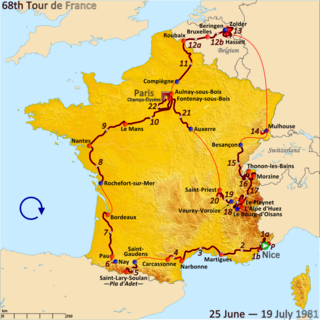
The 1981 Tour de France was the 68th edition of the Tour de France, taking place between 25 June and 19 July. The total race distance was 24 stages over 3,753 km (2,332 mi). It was dominated by Bernard Hinault, who led the race from the sixth stage on, increasing his lead almost every stage. Only Phil Anderson was able to stay close to him, until the 16th stage when he fell behind by about 7:00, and then on the 17th stage he would lose another 17 minutes. In the end only Lucien Van Impe, Robert Alban and Joop Zoetemelk were able to finish inside 20:00 of the now three time champ.

The 1979 Tour de France was the 66th edition of the Tour de France, one of cycling's Grand Tours. It took place between 27 June and 22 July, with 24 stages covering a distance of 3,765 km (2,339 mi). It was the only tour to finish at Alpe d'Huez twice. It was won by Bernard Hinault, who also won the points classification, and whose team won both team classifications. Remarkably Hinault and second-place finisher Joop Zoetemelk finished nearly a half hour ahead of the other GC Contenders, and in modern history this was the only time the Yellow Jersey was challenged on the ride into Paris. The mountains classification was won by Giovanni Battaglin, and the young rider classification was won by Jean-René Bernaudeau.

The 1978 Tour de France was the 65th edition of the Tour de France, one of cycling's Grand Tours. It took place between 29 June and 23 July, with 22 stages covering a distance of 3,908 km (2,428 mi).
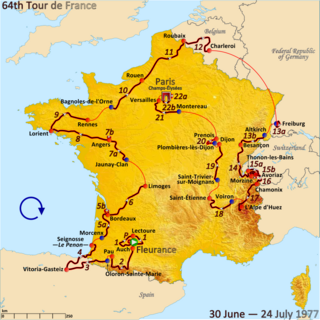
The 1977 Tour de France was the 64th edition of the Tour de France, taking place between 30 June and 24 July. The total race distance was 22 stages over 4,096 km (2,545 mi).
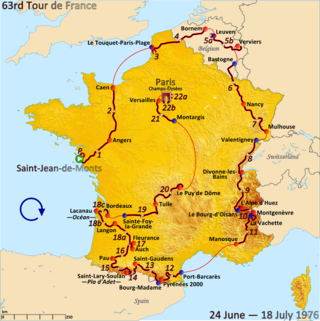
The 1976 Tour de France was the 63rd edition of the Tour de France, one of cycling's Grand Tours. It took between 24 June and 18 July, with 22 stages covering a distance of 4,017 km (2,496 mi). It was won by mountain specialist Lucien Van Impe in a battle with the previous winner Bernard Thévenet and Joop Zoetemelk. Zoetemelk won three high mountain stages including Alpe d'Huez and Puy-de-Dôme but this Tour became known for when the young directeur sportif of Van Impe, Cyrille Guimard, threatened to run Van Impe off the road with the Team Car if he didn't attack. Van Impe then attacked and won the Tour.

The 1974 Tour de France was the 61st edition of the Tour de France, one of cycling's Grand Tours. It took place between 27 June and 21 July, with 22 stages covering a distance of 4,098 km (2,546 mi). Eddy Merckx was attempting to win his fifth Tour de France in as many races.
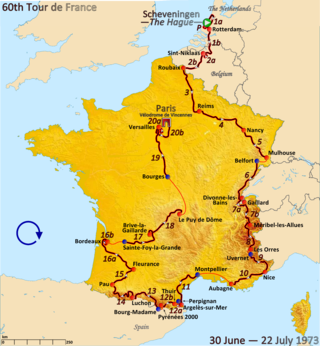
The 1973 Tour de France was the 60th edition of the Tour de France, one of cycling's Grand Tours. It took place between 30 June and 22 July, with 20 stages covering a distance of 4,090 km (2,541 mi). Eddy Merckx, winner of the previous four editions, did not start the 1973 Tour, partly to avoid angry French fans and partly to please his sponsor; instead he rode and won the 1973 Vuelta a España and the 1973 Giro d'Italia. In his absence, Luis Ocaña dominated the race by winning four mountain stages and two time trials. The result being a margin of victory exceeding 15 minutes.
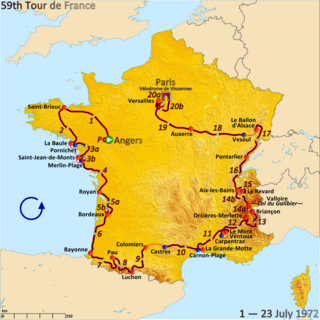
The 1972 Tour de France was the 59th edition of the Tour de France, one of cycling's Grand Tours. It took place from 1 to 22 July, with 20 stages covering a distance of 3,846 km (2,390 mi). After riding strongly in the first two weeks of the race and being the closest GC contender to Eddy Merckx, Luis Ocaña crashed, in the Pyrenees, leaving Merckx to battle Cyrille Guimard for the win. Guimard, having won four stages, had to leave the race after stage 17 in second place, but was given the combativity award after the race.

The 1970 Tour de France was the 57th edition of the Tour de France, one of cycling's Grand Tours. It took place between 27 June and 19 July, with 23 stages covering a distance of 4,254 km (2,643 mi). It was the second victory for Belgian Eddy Merckx, who also won the mountains classification, and nearly won every major jersey for a 2nd year in a row but finished second in the points classification behind Walter Godefroot by five points. The previous year only one rider was able to keep him within 20:00 and in 1970 a mere four other riders were within 20:00, with only debutant Joop Zoetemelk finishing inside 15:00 of Merckx.

The 1936 Tour de France was the 30th edition of the Tour de France, taking place from 7 July to 2 August. It was composed of 21 stages with a total length of 4,442 km (2,760 mi). Because of health problems, Henri Desgrange stopped as Tour director, and was succeeded by Jacques Goddet.

Wouter "Wout" Wagtmans was a Dutch road bicycle racer.

The combativity award is a prize given in the Tour de France for the most combative rider overall during the race. Historically, it favored constant attackers as it was based on the distance spent in a breakaway, included winning checkpoints and outright stage wins. Today, the winner is chosen by a jury. Besides the overall winner, the jury also awards a combativity award to the most aggressive rider at the end of each stage, with this rider allowed to wear a golden number the following race day.

TI–Raleigh was a Dutch professional track cycling and road bicycle racing team between 1972 and 1983. In that decade the team won over 900 races. The team was created and led by Peter Post. In his own cycling career, his nickname was the Six Days Emperor, being a track champion. He also won the 1964 fast edition of Paris–Roubaix. Post was pretty harsh on himself. He had no time to celebrate and was always looking ahead at the next race. That attitude might have been the key to the team's success.
References
- 1 2 Coyle, Daniel (2005). Tour de Force. London: CollinsWillow. pp. 316–321. ISBN 0-00-720922-3.
- ↑ "17 teams issue challenge over organizing of events". International Herald Tribune . Associated Press. 2008-07-15. Retrieved 2008-07-16.
- ↑ Kita, Joe (2008). "Tour de France". Microsoft Encarta Online Encyclopedia. Archived from the original on 2009-08-29. Retrieved 2008-07-15.
- 1 2 "A-Z of Le Tour". BBC . 2008-06-28. Retrieved 2008-07-15.
- ↑ Guinness, Rupert (2008-07-15). "Evans in yellow as Piepoli wins". The Sydney Morning Herald . Retrieved 2008-07-15.
- 1 2 "Theo Middelkamp - www.wielercentrum.com/tourdefrance [Nederlandse Tourhelden]". Archived from the original on 2012-03-08. Retrieved 2010-01-11.
- ↑ "Wim van Est - www.wielercentrum.com/tourdefrance [Nederlandse Tourhelden]". Archived from the original on 2012-03-08. Retrieved 2010-08-09.
- ↑ "Tour 2009 - het laatste nieuws van de tour de france/Nederlanders | al twintig jaar geen geel". Archived from the original on 2009-07-04. Retrieved 2009-07-13.
- ↑ "Ranglijst Nederlanders gele trui - www.wielercentrum.com/tourdefrance [Statistieken]". Archived from the original on 2012-10-18. Retrieved 2019-11-19.
- ↑ "Internet, televisie, vast bellen en mobiel met 4G netwerk - KPN". hetnet.nl.